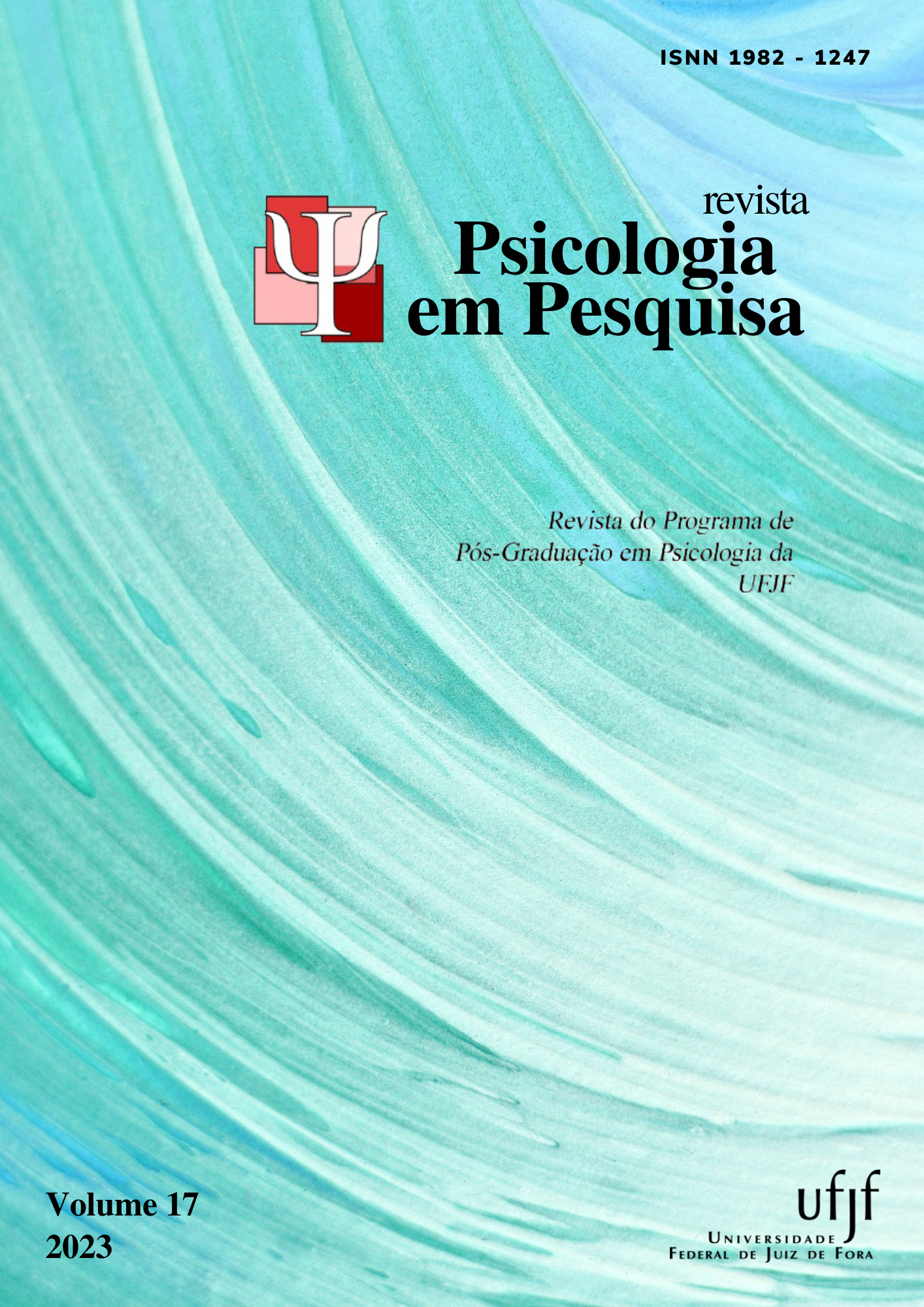Uma revisão dos modelos mnêmicos e evidências sobre o efeito dos afetos e do contexto na memória
DOI:
https://doi.org/10.34019/1982-1247.2023.v17.35179Palavras-chave:
Memória; Neurociência; Afetos., Memory, Neuroscience, Affections, Memoria, Neurociencia, AfectosResumo
A memória é uma função psicológica extremamente complexa. Diversos modelos teóricos estão presentes na literatura, os quais, por sua vez, visam explorar e descrever processos de codificação, consolidação e evocação. No entanto, a organização desses modelos ainda é incipiente, o que dificulta o estabelecimento da conexão entre eles. Por conseguinte, este trabalho visa apresentar e conectar tais modelos teóricos, bem como discutir as principais evidências do efeito do contexto interno (estado) e externo sobre a memória.
Downloads
Referências
Arts, N. J., Walvoort, S. J., & Kessels, R. P. (2017). Korsakoff's syndrome: A critical review. Neuropsychiatric Disease and Treatment, 13, 2875-2890. https://doi.org/10.2147/NDT.S130078
Atkinson, R. C., & Shiffrin, R. M. (1968). Human memory: A proposed system and its control processes. In K. Spence, J. T. Spence (Eds.) Psychology of learning and motivation (Vol. 2, pp. 89–195). Elsevier.
Baddeley, A. D. (2000). The episodic buffer: A new component of working memory? Trends in Cognitive Sciences, 4, 417-423. https://doi.org/10.1016/S1364-6613(00)01538-2
Baddeley, A. D., & Hitch, G. (1974). Working memory. In G. H. Bower (Ed.) Psychology of learning and motivation (Vol. 8, pp. 47–89). Elsevier.
Bartlett, F. C. (1932). Remembering: A study in experimental and social psychology. Cambridge University Press.
Bartlett, J. C., & Santrock, J. W. (1979). Affect-dependent episodic memory in young children. Child Development, 50(2), 513-518.
Blaney, P. H. (1986). Affect and memory: A review. Psychological Bulletin, 99(2), 229–246.
Dulsky, S. G. (1935). The effect of a change of background on recall and relearning. Journal of Experimental Psychology, 18(6), 725–740.
Ebbinghaus, H. (1964). Memory: a contribution to experimental psychology. (H. A. Ruger, C. E. Bussenius, Trads.). Dover Publications. (Original publicado em 1885).
Graf, P., & Schacter, D. L. (1985). Implicit and explicit memory for new associations in normal and amnesic subjects. Journal of Experimental Psychology: Learning, Memory, and Cognition, 11(3), 501-518. Recuperado de http://paperpile.com/b/jEvDRl/WiUp
Godden, D. R., & Baddeley, A. D. (1975). Context-dependent memory in two natural environments: On land and underwater. British Journal of Psychology , 66(3), 325–331.
Hebb, D. O. (1972). Textbook of psychology. Saunders.
James, W. (1890). The principles of psychology, Vol I. Henry Holt and Co. https://doi.org/10.1037/10538-000
Kensinger, E. A., & Ford, J. (2020). Retrieval of Emotional Events from Memory. Annual Review of Psychology, 71, 251-272. https://doi.org/10.1146/annurev-psych-010419-051123
Loftus, E. F. (1997). Creating false memories. Scientific American, 277, 70-75.
Loftus, E. F., & Palmer, J. C. (1974). Reconstruction of automobile destruction: An example of the interaction between language and memory. Journal of Verbal Learning and Verbal Behavior, 13(5), 585–589.
Lowe, G. (1982). Alcohol-induced state-dependent learning: Differentiating stimulus and storage hypotheses. Current Psychology , 2(1-3), 215–222.
Miles, C., & Hardman, E. (1998). State-dependent memory produced by aerobic exercise. Ergonomics, 41(1), 20–28.
Platão (2001) Teeteto. (C. A. Nunes, Trad.). UFPA (Original publicado em 369 a.C.).
Pointer, S. C., & Bond, N. W. (1998). Context-dependent memory: Colour versus odour. Chemical Senses, 23(3), 359–362.
Russell, J. A., & Barrett, L. F. (1999). Core affect, prototypical emotional episodes, and other things called emotion: Dissecting the elephant. Journal of Personality and Social Psychology, 76(5), 805–819.
Schacter, D. L. (1987). Implicit memory: History and current status. Journal of Experimental Psychology: Learning, Memory, and Cognition, 13(3), 501-518.
Scoville, W. B., & Milner, B. (1957). Loss of recent memory after bilateral hippocampal lesions. Journal of Neurology, Neurosurgery and Psychiatry, 20, 11-21.
Simons, J. S., Ritchey, M., & Fernyhough, C. (2022). Brain mechanisms underlying the subjective experience of remembering. Annual Review of Psychology, 73,159-186. https://doi.org/10.31234/osf.io/3642t
Smith, S. M. (1985). Background music and context-dependent memory. The American Journal of Psychology, 98(4), 591-603.
Squire, L. R. (1992). Memory and the hippocampus: A synthesis from findings with rats, monkeys, and humans. Psychological Review, 99(2), 195-231.
Snyder, M., & White, P. (1982). Moods and memories: Elation, depression, and the remembering of the events of one's life. Clinical Trial Journal of Personality, 50(2), 149-167.
Tulving, E. (1972). Episodic and semantic memory. In E. Tulving, W. Donaldson (Eds.), Organization of memory (pp. 381-403). Cambridge, Academic Press.















